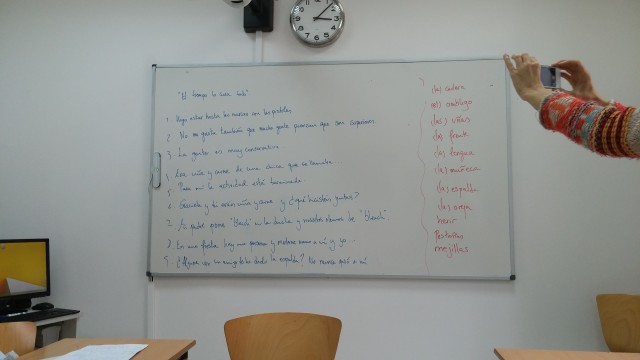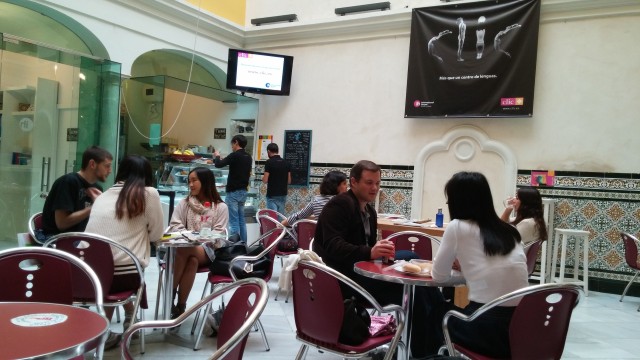
Wynette: Today Charlie took a train to Madrid to meet his sister Pat at the aeropuerto. She is joining us for two weeks while we are here in Spain. Charlie and Pat will sight-see around Madrid till Friday then come back here to Seville. I stayed behind in Seville to take a Spanish class at a well-recommended language school called Clic. The class, Conversation and Grammar Review, started on Monday and will meet every day this week from 1:30 to 3:10. It’s a pleasant 30 minute walk from our apartment to the class location in the old town.
There are 5 students in my class: an Italian man, a German woman, a Belgian man, an English woman, and me. (It’s like dinner at an albergue on the camino.) So, we all speak Spanish with a different, not-very-Spanish, accent. I have the hardest time understanding the Italian man. He speaks Spanish fast. I really like the class, the teacher, and everyone in the class. The teacher’s name is “Irene”, pronounced “ee-ray-nay”. I am by far the oldest in the class, but the German and Belgian might be in their late 30s or 40s. The Italian and Brit are probably only in their 20s. I bet everyone in the class, except the teacher, speaks better English than Spanish, and the teacher speaks English, too, but, everything is in Spanish including instructions for exercises, etc.
We have met two days now. The first day, among other things, we talked about idioms that derive from parts of the body. Think of some we have in English such as “to turn your back on someone” or “on the other hand” or “stick your neck out”. Well, there are jillions of them. Some we learned in Spanish are “dar la espalda”, which literally means “to give the back” and means pretty much the same as we mean by “turn your back.” Another is “cree que es el ombligo del mundo”, he thinks he’s the belly button of the world, which means he is self-centered. “No tiene pelos en la lengua” literally says “he doesn’t have hairs on the tongue” and means “he doesn’t mince words.” The Spanish say “toma el pelo”, he’s pulling your hair, to mean what we mean when we say “he’s pulling your leg”.
The teacher had us break into (very small) groups to talk about situations we’d experienced where those idioms applied. We didn’t know she was spying on us and was writing down mistakes we were making in our conversation. Without naming names, she put our mistakes on the board at the end of class to discuss. We didn’t have time to finish so she had us take a photo with our phones and correct the mistakes as homework.
Today for the grammar review part we talked about when to use the various past tenses in Spanish. There are several in Spanish — more than are always apparent in English. For example, the Spanish use a different word for “walked” in these two sentences: “Yesterday when I walked to the store, I fell” and “Yesterday I walked to the store.”

The idioms are sooooooo amusing! Especially the ‘belly button’.
When I told your dad about the “belly button’ idiom and asked if he could guess what it alluded to, he answer was very close to the meaning of being ‘self centered’. Good thinking!